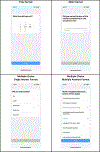Digital Health and Addiction
- PMID: 32885099
- PMCID: PMC7462117
- DOI: 10.1016/j.coisb.2020.07.004
Digital Health and Addiction
Abstract
Digital technologies are rapidly changing how we understand and promote health. A robust and growing line of research has examined how digital health may enhance our understanding and treatment of addiction. This manuscript highlights innovations in the application of digital health approaches to addiction medicine, with a particular emphasis on advances in (1) real-time measurement of drug use events, (2) real-time measurement of the confluence of factors that surround drug use events, and (3) research examining how real-time measurement can inform responsive, in-the-moment interventions to prevent and treat substance use disorder. Although this manuscript focuses on addiction medicine as one exemplar of the striking impact of digital health, science-based digital health offers generalizable solutions to scaling-up unprecedented models of precision healthcare delivery across a broad spectrum of diseases across the globe.
Figures
References
-
- Boyd D and Crawford K : CRITICAL QUESTIONS FOR BIG DATA. Information, Communication & Society, 2012. 15(5): p. 662–679.
Grants and funding
LinkOut - more resources
Full Text Sources

